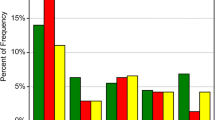Abstract
Aims
The quality report of patients enrolled in the disease management programmes of North Rhine Westphalia 2016 showed prevalence of long-term complications in diabetes type 2: neuropathy 24.2%, nephropathy 12.5%, retinopathy 8.2%. The aim of this study was to assess expectations and fear of diabetes-related long-term complications in people with diabetes type 2.
Methods
We assessed expectations and fear of diabetes-related complications in 104 people with diabetes type 2 (age 67.0J, diabetes duration 6.6J, HbA1c 6.6%/48.6 mmol/mol, neuropathy 20.2%, nephropathy 11.5%, retinopathy 1.9%) in an outpatient healthcare centre at primary care level. Fear of diabetes-related complications was assessed using the “Fear of Complications Questionnaire” (FCQ) with a range of 0–45 points (≥ 30 means clinically meaningful fear, higher scores imply higher level of fear). Furthermore, study participants estimated general and personal risk of suffering from diabetes-related long-term complications after 10 years of diabetes duration on a scale of 0–100%.
Results
Mean FCQ score was 22.9 ± 11.5. 34/104 participants (32.7%) scored ≥ 30 points and thus had great fear. Participants estimated general risk of suffering from diabetes-related complications after 10 years of diabetes duration on 55.1% and personal risk on 46.0%. Risk of diabetes-related complications scoring highest was impaired circulation of lower limb (62.1%), eye complications (57.3%) and kidney complications (54.7%).
Conclusion
Prevalence of diabetes-related long-term complications was overestimated in people with diabetes type 2. Approximately one third of the participants showed even great fear. Patient expectation and fear about diabetes-associated complications did not correspondent with data on clinical reality.
Similar content being viewed by others
Abbreviations
- BMI:
-
Body mass index
- DMP:
-
Disease management programmes
- FCQ:
-
Fear of complications questionnaire
- HbA1c:
-
Glycated haemoglobin
References
Bundesärztekammer (BÄK), Kassenärztliche Bundesvereinigung (KBV), Arbeitsgemeinschaft der Wissenschaftlichen Medizinischen Fachgesellschaften (AWMF). Nationale VersorgungsLeitlinie Therapie des Typ-2-Diabetes—Langfassung, 1. Auflage. Version 4. 2013, zuletzt geändert: November 2014. http://www.dm-therapie.versorgungsleitlinien.de. Accessed 06 Feb 2018
Speight J, Holmes-Truscott E, Harvey DM et al (2016) Structured type 1 diabetes education delivered in routine care in Australia reduces diabetes-related emergencies and severe diabetes-related distress: The OzDAFNE program. Diabetes ResClin Pract 112:65–72
Kuniss N, Kramer G, Müller N et al (2016) Diabetes-related burden and distress is low in people with diabetes at outpatient tertiary care level. Exp Clin Endocrinol Diabetes 124(5):307–312
Pramming S, Thorsteinsson B, Bendtson I, Binder C (1990) Symptomatic hypoglycaemia in 411 type 1 diabetic patients. Diabet Med 8:217–222
Hendricks LE, Hendricks RT (1998) Greatest fears of type 1 and type 2 patients about having diabetes: implications for diabetes educators. Diabetes Educ 24(2):168–173
Quandt SA, Reynolds T, Chapman C et al (2013) Older adults’ fears about diabetes: using common sense models of disease to understand fear origins and implications for self-management. Quant J Appl Gerontol 32(7):783–803
Groos S, Kretschmann J, Macare C, Weber A, Hagen B (2017) Quality assurance report 2016 disease-management-programmes in Northrhine. Available at https://www.kvno.de/downloads/quali/qualbe_dmp16.pdf. Accessed 6 Feb 2018
Heller T, Blum M, Spraul M, Wolf G, Müller UA (2014) Diabetic co-morbidities: prevalences in Germany. Dtsch Med Wochenschr 139(15):786–791
Taylor EP, Crawford JR, Gold AE (2005) Design and development of a scale measuring fear of complications in type 1 diabetes. Diabetes Metab Res Rev 21:264–270
Schmitt A, Reimer A, Kulzer B et al (2017) Erfassung von Angst vor diabetischen Folgekrankheiten: Reliabilität und Validität der deutschen Version des Fear of Complications Questionnaire (FCQ). Diabetologie Stoffwechsel 12(S 01):S1–S84
Bradley C (1994) Diabetes Treatment Satisfaction Questionnaire (DTSQ). In: Bradley C (ed) Handbook of psychology and diabetes: a guide to psychological measurement in diabetes research and practise. Overseas Publishers Association, London, pp 111–132
World Health Organization, Regional Office for Europe (1998) Use of well-being measures in primary health care—the DepCare project health for all. Target 12. E60246. WHO, Geneva
Herschbach P, Berg P, Dankert A et al (2005) Fear of progression in chronic diseases: psychometric properties of the Fear of Progression Questionnaire. J Psychosom Res 58(6):505–511
Janzen Claude JA, Hadjistavropoulos HD, Friesen L (2014) Exploration of health anxiety among individuals with diabetes: prevalence and implications. Health Psychol 19(2):312–322
Hagen B, Altenhofen L, Blaschy S, Groos S, Kretschmann J, Schmidt A (2010) Quality assurance report 2009 disease-management-programmes in Northrhine. Available at https://www.kvno.de/downloads/quali/qualbe_dmp09.pdf. Accessed 6 Feb 2018
Kuniss N, Müller UA, Kloos C, Jörgens V, Kramer G (2017) Diabetes-related distress is reduced in people with type 1, but not type 2 diabetes after participation in a diabetes treatment and teaching programme. Diabetes Metab. https://doi.org/10.1016/j.diabet.2017.11.008
Funding
None.
Author information
Authors and Affiliations
Corresponding author
Ethics declarations
Conflict of interest
None. All authors declare that they have no competing interests.
Ethical standard
The study was conducted in accordance with the ethical standards laid down in an appropriate version of the 1964 Declaration of Helsinki.
Human and animal rights
All procedures followed were in accordance with the ethical standards of the responsible committee on human experimentation (institutional and national) and with the Helsinki Declaration of 1975, as revised in 2008 (5).
Informed consent
Informed consent was obtained from all patients for being included in the study.
Additional information
Managed by Antonio Secchi.
Rights and permissions
About this article
Cite this article
Kuniss, N., Freyer, M., Müller, N. et al. Expectations and fear of diabetes-related long-term complications in people with type 2 diabetes at primary care level. Acta Diabetol 56, 33–38 (2019). https://doi.org/10.1007/s00592-018-1217-9
Received:
Accepted:
Published:
Issue Date:
DOI: https://doi.org/10.1007/s00592-018-1217-9




